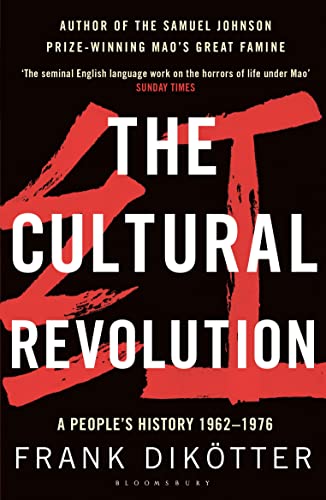Verwandte Artikel zu The Cultural Revolution: A People's History, 1962―197...

Inhaltsangabe
Acclaimed by the Daily Mail as 'definitive and harrowing', this is the final volume of 'The People's Trilogy', begun by the Samuel Johnson prize-winning Mao's Great Famine.
Die Inhaltsangabe kann sich auf eine andere Ausgabe dieses Titels beziehen.
Über die Autorin bzw. den Autor
Frank Dikötter lives in Palo Alto, California, where he is the Milias Senior Fellow at the Hoover Institution, Stanford University. He is also Chair Professor of Humanities at the University of Hong Kong. His books have changed the way historians view China, from the classic The Discourse of Race in Modern China to his award-winning People's Trilogy documenting the lives of ordinary people under Mao.
Von der hinteren Coverseite
Acclaimed by the Daily Mail as 'definitive and harrowing' , this is the final volume of 'The People's Trilogy', begun by the Samuel Johnson prize-winning Mao's Great Famine.
After the economic disaster of the Great Leap Forward that claimed tens of millions of lives between 1958 and 1962, an ageing Mao launched an ambitious scheme to shore up his reputation and eliminate those he viewed as a threat to his legacy. The stated goal of the Cultural Revolution was to purge the country of bourgeois, capitalist elements he claimed were threatening genuine communist ideology. But the Chairman also used the Cultural Revolution to turn on his colleagues, some of them longstanding comrades-in-arms, subjecting them to public humiliation, imprisonment and torture.
Young students formed Red Guards, vowing to defend the Chairman to the death, but soon rival factions started fighting each other in the streets with semi-automatic weapons in the name of revolutionary purity. As the country descended into chaos, the military intervened, turning China into a garrison state marked by bloody purges that crushed as many as one in fifty people.
When the army itself fell victim to the Cultural Revolution, ordinary people used the political chaos to resurrect the marked and hollow out the party's ideology. In short, they buried Maoism. In-depth interviews and archival research at last give voice to the people and the complex choices they faced, undermining the picture of conformity that is often understood to have characterised the last years of Mao's regime. By demonstrating that decollectivisation from below was an unintended consequence of a decade of violent purges and entrenched fear, Frank Dikotter casts China's most tumultuous era in a wholly new light.
Written with unprecedented access to previously classified party documents from secret police reports to unexpurgated versions of leadership speeches, this third chapter in Frank Dikotter's extraordinarily lucid and ground-breaking 'People's Trilogy' is a devastating reassessment of the history of the People's Republic of China.
„Über diesen Titel“ kann sich auf eine andere Ausgabe dieses Titels beziehen.
Gratis für den Versand innerhalb von/der USA
Versandziele, Kosten & DauerNeu kaufen
Diesen Artikel anzeigenGratis für den Versand innerhalb von/der USA
Versandziele, Kosten & DauerSuchergebnisse für The Cultural Revolution: A People's History, 1962―197...
Cultural Revolution
Anbieter: ThriftBooks-Dallas, Dallas, TX, USA
Paperback. Zustand: Very Good. No Jacket. Former library book; May have limited writing in cover pages. Pages are unmarked. ~ ThriftBooks: Read More, Spend Less 0.2. Artikel-Nr. G1408856522I4N10
Anzahl: 1 verfügbar
The Cultural Revolution: A People's History, 1962?1976
Anbieter: WorldofBooks, Goring-By-Sea, WS, Vereinigtes Königreich
Paperback. Zustand: Very Good. The book has been read, but is in excellent condition. Pages are intact and not marred by notes or highlighting. The spine remains undamaged. Artikel-Nr. GOR008323184
Anzahl: 4 verfügbar
The Cultural Revolution
Anbieter: PBShop.store US, Wood Dale, IL, USA
PAP. Zustand: New. New Book. Shipped from UK. Established seller since 2000. Artikel-Nr. DB-9781408856529
Anzahl: 3 verfügbar
Cultural Revolution 1965 1969
Anbieter: Majestic Books, Hounslow, Vereinigtes Königreich
Zustand: New. Artikel-Nr. 374959916
Anzahl: 4 verfügbar
The Cultural Revolution
Anbieter: PBShop.store UK, Fairford, GLOS, Vereinigtes Königreich
PAP. Zustand: New. New Book. Shipped from UK. Established seller since 2000. Artikel-Nr. DB-9781408856529
Anzahl: 3 verfügbar
The Cultural Revolution
Anbieter: Romtrade Corp., STERLING HEIGHTS, MI, USA
Zustand: New. This is a Brand-new US Edition. This Item may be shipped from US or any other country as we have multiple locations worldwide. Artikel-Nr. ABNR-51217
Anzahl: 5 verfügbar
The Cultural Revolution: A People s History, 1962-1976
Anbieter: Kennys Bookstore, Olney, MD, USA
Zustand: New. . . 2017. Paperback. . . . . Books ship from the US and Ireland. Artikel-Nr. V9781408856529
Anzahl: 1 verfügbar
Cultural Revolution
Anbieter: Ria Christie Collections, Uxbridge, Vereinigtes Königreich
Zustand: New. In. Artikel-Nr. ria9781408856529_new
Anzahl: 1 verfügbar
The Cultural Revolution: A People's History, 1962-1976
Anbieter: BOOKIT!, Genève, Schweiz
Zustand: Used: Like New. LIVRE A L?ETAT DE NEUF. EXPEDIE SOUS 3 JOURS OUVRES. NUMERO DE SUIVI COMMUNIQUE AVANT ENVOI, EMBALLAGE RENFORCE. EAN:9781408856529. Artikel-Nr. SVALIVCN-9781408856529
Anzahl: 1 verfügbar
The Cultural Revolution: A People's History, 1962-1976 (Peoples Trilogy 3)
Anbieter: Revaluation Books, Exeter, Vereinigtes Königreich
Paperback. Zustand: Brand New. 448 pages. 7.72x5.04x1.18 inches. In Stock. Artikel-Nr. __1408856522
Anzahl: 1 verfügbar

